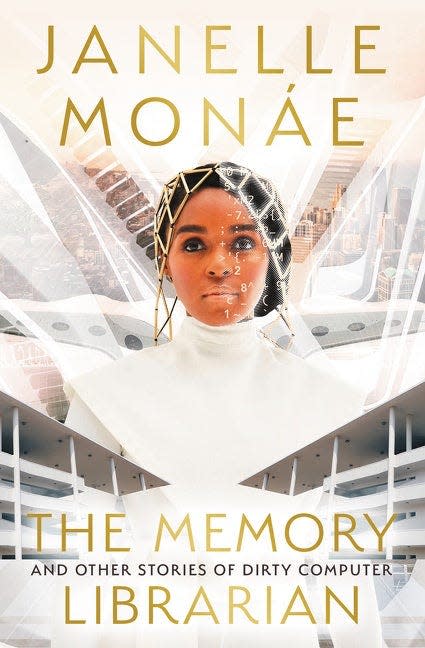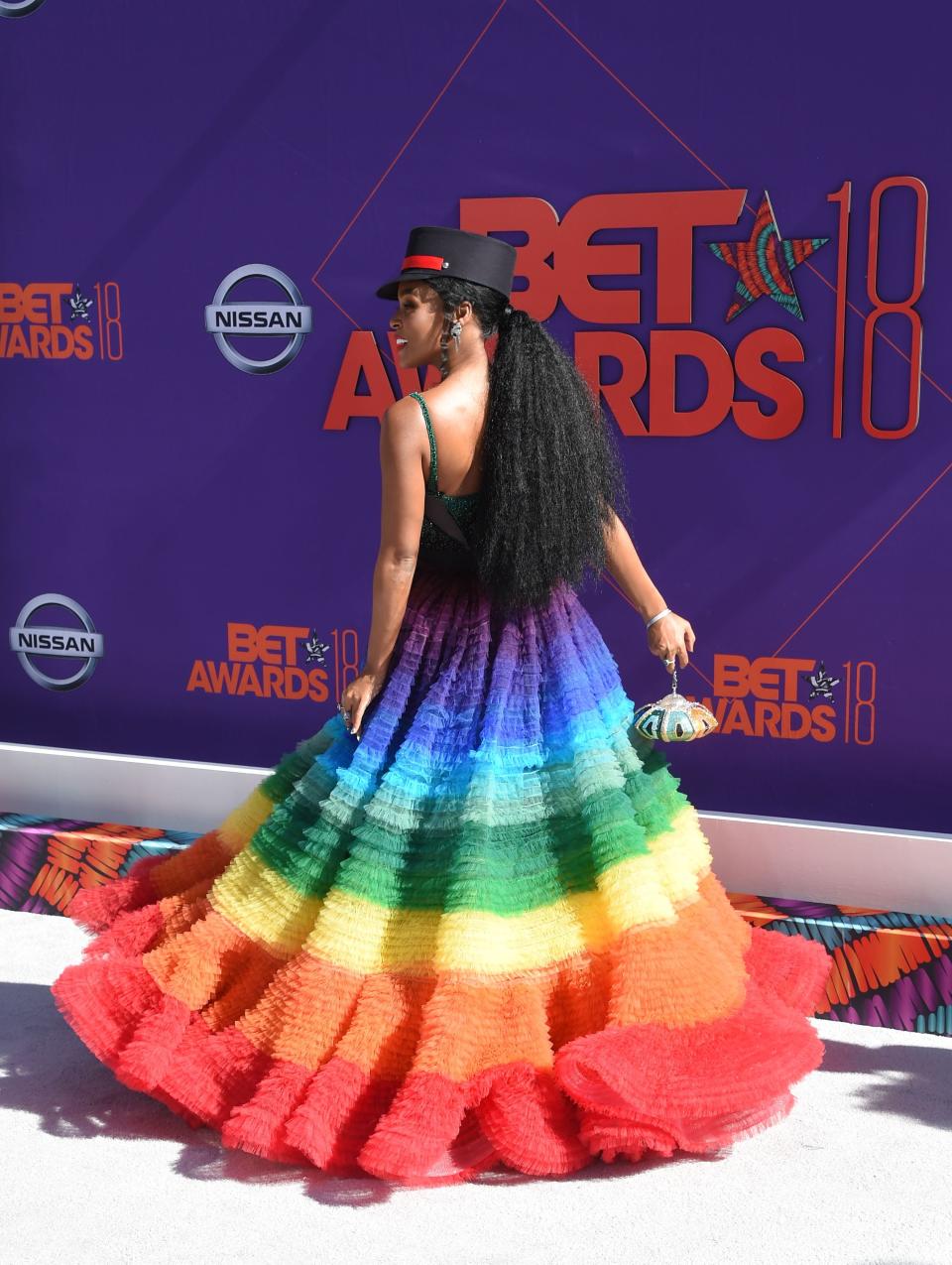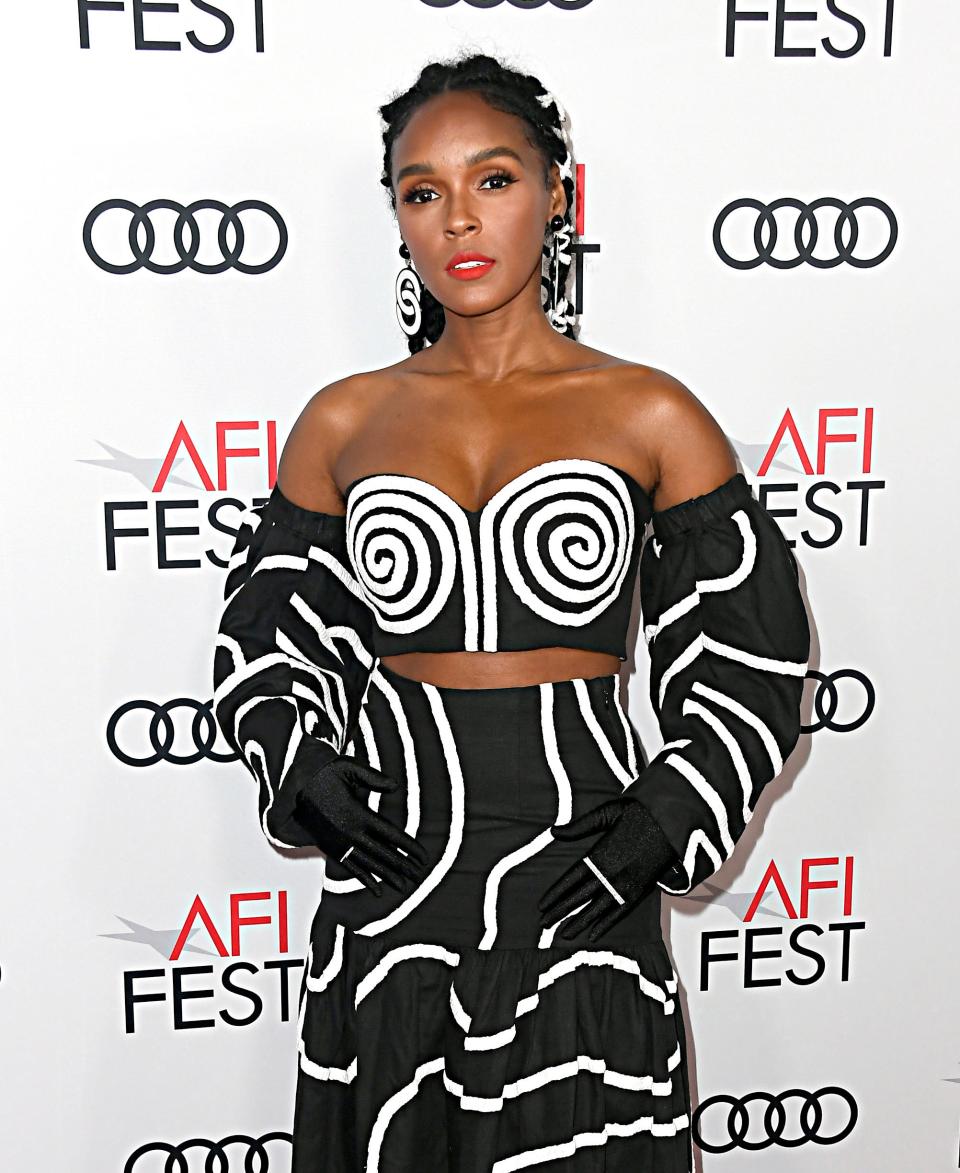'The Memory Librarian': Janelle Monáe tackles technology and queerness in Afrofuturistic new book

Singer-songwriter Janelle Monáe is bringing to life the Afrofuturistic world of her album “Dirty Computer” with the release of her debut book “The Memory Librarian: And Other Stories of Dirty Computer” (Harper Voyager, 336 pp., ★★★? out of four, out now).
A collection of dystopian sci-fi stories set in the totalitarian society of New Dawn, “The Memory Librarian” expands on the themes of identity and social justice explored in Monáe’s 2018 album, which debuted at No. 6 on the Billboard 200 chart and scored the singer two Grammy nominations.
In New Dawn, citizens live in a hypervigilant, technocratic state in which memories, dreams and individuality are tightly regulated by government forces. People who refuse to conform are regarded as inherently flawed, “dirty computers” that need to be cleansed of their deviance.
'Red Table Talk': Janelle Monáe comes out as nonbinary
“Dirty computer, walk in line. If you look closer, you'll recognize I'm not that special; I'm broke inside,” Monáe sings in the opening lines of “Dirty Computer.” “Crashing slowly, the bugs are in me.”
Through the stories and characters introduced in “The Memory Librarian,” Monáe and contributing authors Alaya Dawn Johnson, Yohanca Delgado, Eve L. Ewing, Danny Lore and Sheree Renée Thomas offer a poignant commentary on the power of technology, the preservation of queer identity and the commodification of time.

More: 20 must-read spring books from Viola Davis, Janelle Monáe, Robin Roberts, Don Winslow and more
The digital dilemma of high tech
Monáe paints a chilling picture of the double-edged sword of mass technology in advanced societies.
In New Dawn, technology is used as a punitive tool to enforce conformity and hijack individuality to create a more secure humanity, or an “an all-seeing people.” Memory recollection boxes convert citizens’ memories to currency and surveillance drones menacingly roam the streets in this digital dystopia.
“We already believed in an infinite web, so why not hardwire an eye to each of its strands? A camera on your home. A camera on a phone. A camera on a badge. A camera on a drone. And so on,” Monáe writes.
Monáe also illustrates how technology can reflect and reinforce harmful biases within humanity. In the opening short story “The Memory Librarian,” Seshet, director librarian of the city Little Delta, has an artificially intelligent memory keeper, Dee, as an assistant. Although Seshet is a Black woman, Dee’s features reflect Eurocentric beauty norms – “eyes blue as the Caribbean Sea” – and Seshet’s longtime dissatisfaction with her own appearance.
“The girl Seshet had been hated her dunbrown irises, longed for them to be the blue of the dolls in the store and the children in her headset. No one on the programs had her dark skin or kinky hair,” Monáe writes. “She’d longed for eyes so blue they’d glow like the sky, even at night.”

Look back: 'White men owe Black women peace': Janelle Monae on why 'Antebellum' is relevant
But Monáe also vividly depicts how technology can be used for the betterment of humanity, such as when it’s used to prioritize the safety and well-being of individuals. This potential is illustrated in the short story “Timebox Altar(ed),” when a young girl named Ola comes across a drone that performs a health-and-wellness check on her after injuring herself in a near-miss with a hovercraft.
More: Will Smith's memoir gets a sales spike post-Oscars slap; 'Half Baked Harvest' tops best sellers list
They're here, they're queer, get used to it
Although gender nonconformity and queer sexuality are considered deviant behaviors in the world of New Dawn – earning citizens an immediate classification as a “dirty computer” – Monáe, who identifies as pansexual and nonbinary, underscores the importance of protecting the LGBTQ community.
Many of the book's characters are queer or nonbinary, including Seshet, who becomes romantically involved with a trans woman named Alethia in the short story “The Memory Librarian.” Seshet and Alethia visit an underground dive bar, where Seshet encounters “men in dresses and women in sharpcut suits and others who defy any gender categorization at all.”
Despite her governmental role, Seshet feels a kinship with these “dirty computers,” which leads her to overlook these citizens’ rebellious behaviors.
“She has maintained the heart of the city in a mold as pure as any New Dawn could hope for,” Monáe writes. “But she averted her gaze from the edges, from the ones who would never fit anyway. The ones who looked like her – and didn’t look like them.”

Look back: Janelle Monae on 'Homecoming' Season 2, Little Richard and why she can't make music in quarantine
In the short story “Nevermind,” a group of marginalized women form the Pynk Hotel community, “a place that opened its arms to anyone who located themselves in womanhood, however they came to understand it.” The hotel’s name comes from Monáe’s female empowerment anthem “Pynk.”
One of the residents, a nonbinary woman named Neer, faces opposition from fellow resident Rhapsody, who takes issue with Neer’s alternative view of gender and womanhood. During a raid of the Pynk Hotel by New Dawn authorities, Rhapsody makes her feelings about Neer’s place in the community perfectly clear.
“I’m not going to let you reinvent the hotel in your image. That’s how our spaces become the space of men, of misogynists,” Rhapsody says to Neer in a tense confrontation.
But Neer knows deep down that gender identity is an integral part of people’s inherent essence, something that can’t be destroyed by Rhapsody’s animosity or New Dawn’s restrictiveness.
“I wonder though whether they could ever even erase that existence from any of us,” Neer reflects. “It’s not just memory that makes us women, that makes me genderqueer. It’s something else. So, I wonder if we’d ever be clean enough for them.”
More: What your pansexual friend wishes you knew: 'It’s a very fluid thing'
Reclaiming our time
Monáe deconstructs the concept of time and reframes it as a collective resource rather than an individualized commodity.
In the short story “Timebox,” Raven and Akilah, a young couple who’ve recently moved into a new apartment, discover the pantry in their apartment is a “timebox”: an insulated space that suspends the chronological flow of time outside. They can spend several minutes – or hours – inside the pantry, and when they step back out, time will resume at the moment they left it.
Akilah wants to use the timebox as a community resource. She envisions harnessing the timebox’s power to champion “collective responsibility,” “end capitalism” and help marginalized individuals whose time has been systematically shortchanged.
“There are Black women out there who are really – really in need,” Akilah explains.
More: 'Portrait of a Thief': Brainy heist novel seeks to steal back looted Chinese art
While Raven initially has her doubts about opening the timebox – and their home – to the general public, Raven comes to realize that it has the potential to become a revolutionary community resource.
The use of time is also explored in the short story “Save Changes,” which centers on sisters Amber and Larry, whose mother, a former insurgent, is placed on house arrest after a botched New Dawn cleansing leaves her in a mentally erratic state.
Amber possesses a charmed larimar stone that has the power to reverse time, given to her by her mineworker father Pablo shortly before his death. Amber remains upset with her father for not using the stone’s power to undo the cleansing of her mother.

More: The best books of 2022: What USA TODAY's critics loved reading so far
It is later revealed to Amber that Pablo did use the stone to reverse the cleansing of her mother Diana, which allows them to reconnect after Larry is taken away by New Dawn authorities. Pablo elected not to use the larimar stone previously after being informed "the larimar would reverse time just once in his lifetime, before he passed it on to his eldest child.”
By reframing aspects of social life and identity, which can often feel convoluted and heavy, in a heightened, dystopian context, Monáe reveals the simplicity of our shared humanity. “The Memory Librarian” shows us the future can be an unnerving reflection of our unexamined vices, but we can also plant the seeds for a brighter tomorrow.
This article originally appeared on USA TODAY: Janelle Monáe's book 'The Memory Librarian' takes us to the future